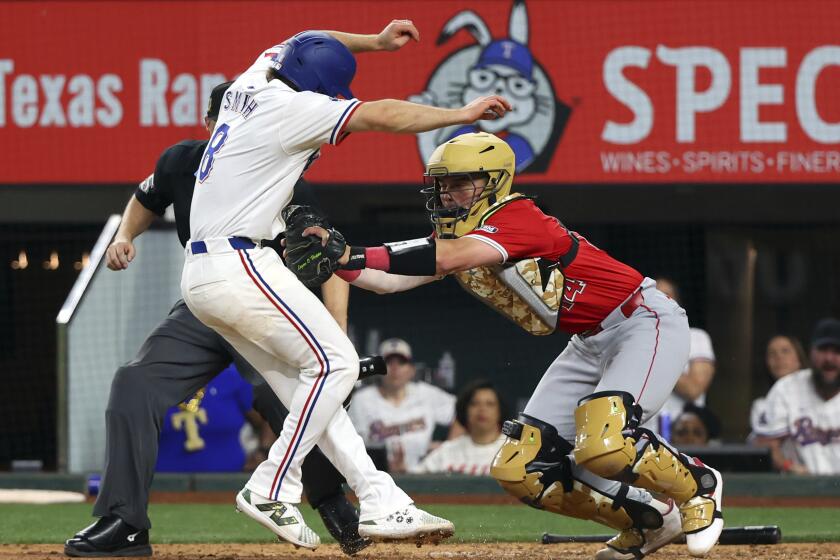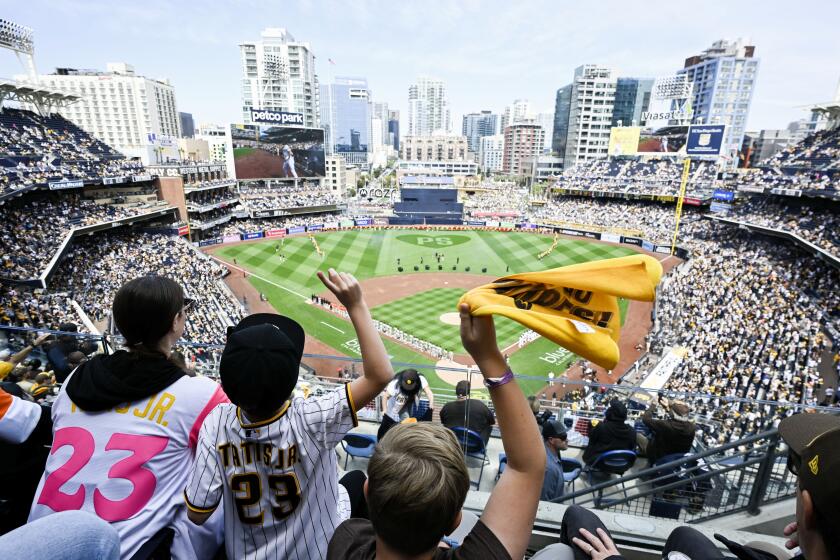Anaheim Is L.A.? Geographically, Giants’ Baker Is Way Off Base
Before the first pitch of this World Series had been thrown, Giants manager Dusty Baker brushed back the Angels and their fans with a high hard one. Right under the chin. A message pitch, as they say in baseball.
“Beat L.A.!” Dusty crowed, echoing cries heard earlier in the evening from San Francisco fans after the Giants knocked off the Cardinals to earn their World Series trip. Then, perhaps recalling vaguely where Anaheim was, Baker amended his remarks: “Southern L.A. It’s Orange County, but let’s beat L.A.”
In a few choice words, Baker hit Anaheim and Orange County fans where they live. Literally. Four hundred miles away, 2.7 million people groaned.
Beat L.A.?
Los Angeles. Orange County. Hollywood. Anaheim. What the heck’s the difference? It’s all one big offramp, right? It’s all SoCal, right? We’re all in La-La Land down here.
To Dusty Baker, apparently so. And this from a man who grew up in Riverside and played eight seasons with the Dodgers. If Dusty can’t or won’t distinguish L.A. from O.C., can we hope for much more from the rest of the country?
Probably not.
In short, here we go again. Even in their moment of seminal glory -- the long-awaited trip to the World Series -- Angel fans in particular and Orange County in general can’t escape the shadow of Los Angeles.
Does it matter? At the risk of over-thinking the issue, you’re darn tootin’ it does.
Logical or not, championship sports teams carry their local fans right along with them. Psychologists will tell you there’s a transference of pride and joy that passes between a team and its fans.
At a primal level, fans feel more worthy because their valiant warriors fought off all comers and emerged victorious. If fans didn’t feel that way, they wouldn’t care if the team won or lost.
The Yankees are mighty, so New Yorkers feel mighty. The Green Bay Packers have a permanent niche in American sports history, so their fans feel special -- and not just because they’re shareholders in the team.
Now come the Angels. If they are winners, then, by God, so are we. You think those delirious fans at Edison Field last weekend were exulting just for the players and Disney management?
Nope, the World Series is the national stage on which all of Orange County emerges as a success story.
Which is why Dusty Baker’s zinger galled so many.
It’s like Miss Virginia winning the Miss America pageant only to hear the judges mistakenly announce the winner as Miss West Virginia.
Beat L.A.
Hasn’t Orange County itself spent the better part of the last 40 years trying to beat L.A.? Stretching the point or not, at the very least we can say for sure the county doesn’t want to be thought of synonymously with its older brother to the north.
The county has tried to carve out its own identity. To an extent, it’s still living down an image from a rapidly fading past.
“In terms of an identity issue,” says Calvin Morrill, chairman of the UC Irvine sociology department, “there’s always been this perception -- and I think it still persists around the country -- that Orange County is a hotbed of Republican conservatism. It takes a while to change that.”
Maybe that reputation persists because at one time it was more than conservative; it was seen as nearly Neanderthal.
The late Walter Knott, the amusement park builder later considered “Mr. Republican” in the county, set the tone in the early 1960s when he wrote to Richard Nixon, who was running for governor: “We will do everything we can to help you win in November, but it would make our work much easier in Orange County if you would lay off the John Birch Society and refrain from depreciating the conservative movement.”
For the next generation, Orange County was thought of not just as politically conservative, but as ultraconservative.
The “Orange Curtain,” as Morrill notes, wasn’t as mythical as it sounds. On one side was the white population of Orange County; on the other, the increasingly multihued Los Angeles.
That was then, and this is now. Whether the rest of America knows it or not, Orange County 2002 is a melting pot.
“Orange County,” a movie released this year, probably reinforced another erroneous stereotype, Morrill says -- that of the “upper middle-class beach culture, rather vacuous, meaningless, post-suburbia kind of existence.”
Orange County still has conservative Republicans and malaise among its youth, but neither accurately defines the county, Morrill says.
What does are things like its emerging immigrant populations and its diversified and growing economy.
Still, there is the identity issue.
We can’t really blame casual sports fans around the United States if they don’t have Anaheim and Orange County on their radar screens.
Until the 1990s, the county was home to only two major sports franchises, the Angels and the football Rams. Throughout their tenure in Anaheim and before leaving in 1995, the Rams retained the “Los Angeles Rams” name they brought with them from L.A. And only in 1997, after 30 years in Orange County, did the Angels adopt the “Anaheim” moniker. Only the Mighty Ducks of the NHL started and stayed with Anaheim as the team name.
Mike Blake, a former Brea resident for 23 years and author of five baseball books, now lives in northern Michigan. “I’m not sure the public knows where Anaheim is,” he says.
Not even the World Series, Blake says, will emboss Anaheim and Orange County on the country’s consciousness.
“I think it’s a step,” he says. “I don’t think it’s a panacea. Should the Angels be prominent again over the next couple years, or should the Mighty Ducks ever get into the playoffs and do anything, should another team call Orange County its home, it’s a possibility. This won’t go down as one of the most greatly watched World Series. There’s no real history between these teams. So this is a step.”
Should we care about being recognized?
“For community self-respect and personal self-respect, yes,” Blake says. “For potential business, yes.”
But he and Morrill say the county’s diversity and division into 34 cities works against a single view of ourselves, even from within.
The result, Morrill says, is less “solidarity” among residents of different cities. “What Orange County is is a metroplex,” Morrill says. “It’s not a city, but it’s not a county in the usual sense, either.”
Therein lies an inherent problem for the Angels. While Anaheim Mayor Tom Daly rightly says the World Series is a great opportunity for his city to emerge, I’d argue that the team’s more accurate name would be Orange County Angels.
Blake disagrees. He thinks the Angels mainly are the province of North County residents. He wonders whether South County or the beach cities, as a whole, embrace the team like the residents of Brea, Anaheim or Fullerton.
Sheesh. That leads us right back to the nub of the conundrum. Even if we who live here were to define Orange County, how would we do it?
Are we the Surf City of Huntington Beach? The Little Saigon of Westminster? The working-class neighborhoods of Garden Grove? The comfortably rich of Newport Beach? The planned communities of Irvine and Mission Viejo?
Other cities around the country have their different neighborhoods. In Orange County, our diversity shows up in different cities.
That’s too complicated for TV to capture. To coin a word, Orange County isn’t as “graspable” as the good folks of Green Bay or even the New Yorkers we’ve come to know and love.
Surely there are worse lots in life than to be an undefinable metroplex.
Still, as elusive as our true identity may be, Orange County most definitely knows who it is not.
For better or worse, we are not L.A.
So, Dusty Baker wants to beat L.A.? Go right ahead.
As long as his Giants don’t beat the Angels, nobody -- from San Clemente to La Habra -- cares what the Giants do to L.A.
*
Dana Parsons’ column appears Wednesdays, Fridays and Sundays. Readers may reach Parsons by calling (714) 966-7821 or by writing to him at The Times’ Orange County edition, 1375 Sunflower Ave., Costa Mesa, CA 92626, or by e-mail to dana.parsons@latimes.com.
More to Read
Go beyond the scoreboard
Get the latest on L.A.'s teams in the daily Sports Report newsletter.
You may occasionally receive promotional content from the Los Angeles Times.




